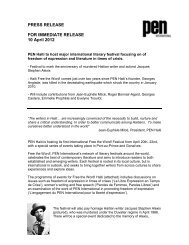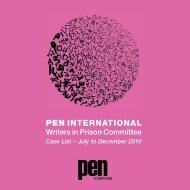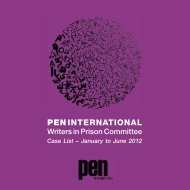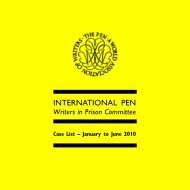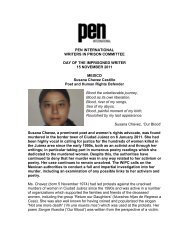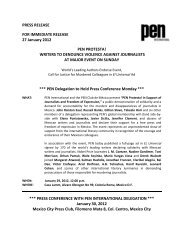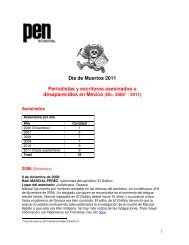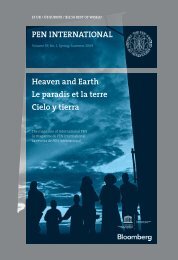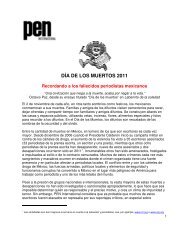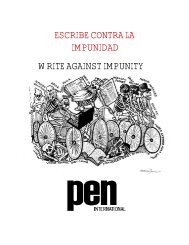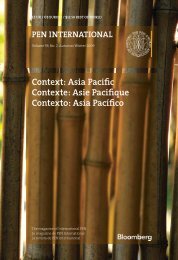Sierra Leone Junior PENPoint Magazine - Pen International
Sierra Leone Junior PENPoint Magazine - Pen International
Sierra Leone Junior PENPoint Magazine - Pen International
Create successful ePaper yourself
Turn your PDF publications into a flip-book with our unique Google optimized e-Paper software.
<strong>Junior</strong> <strong>Pen</strong> Point <strong>Magazine</strong> May 2008 Page 3<br />
THE ROLE OF WRITERS IN SIERRA LEONE<br />
As I thought about presenting<br />
a paper on the role of<br />
writers in <strong>Sierra</strong> <strong>Leone</strong>, the importance<br />
of building a bridge over<br />
a gaping valley, which you and<br />
others can safely go across, assumed<br />
a significance and magnitude<br />
which I had hitherto,<br />
never been aware of or never<br />
given thought to. I go for the imagery<br />
of a bridge because – a<br />
bridge is a thing that provides<br />
connection, contact. A common<br />
language is a bridge between cultures-<br />
a writer uses language –<br />
writing is communication- writers<br />
are communicators with an<br />
obligation to create access into<br />
the hearts of their audience and<br />
also for their audience into their<br />
Writers may build or destroy relationships<br />
within their communities.<br />
So considering the importance<br />
of a bridge in linking two<br />
blocks of territory which may be<br />
home to people of like or diverse<br />
orientation and cultures, I also<br />
came to realize that the necessity<br />
for the writers to be a responsible<br />
and skilled contractor cannot<br />
be over emphasized.<br />
Let us come to an agreement<br />
that writers are people who<br />
write under whatever genre they<br />
choose, with the intention of having<br />
their material read or accessed<br />
by a target group within<br />
their world. Because wisdom and<br />
experience have it that “the pen<br />
is mightier than the sword”, I<br />
want to advice and believe that<br />
all who wield the pen must at<br />
least have some awareness of its<br />
potency, and also the gravity of<br />
its consequences both for its audience<br />
and themselves. Just as<br />
no word should be carelessly spoken<br />
so none should be written<br />
and broadcast or published without<br />
thorough examination of its<br />
implications for the minds of all<br />
to whom it will be exposed.<br />
You might choose to communicate<br />
with your society by<br />
writing a novel, play, short story,<br />
screenplay, song, poem or article.<br />
Whichever you choose, never<br />
lose sight of your responsibility<br />
to your audience. It is sacred.<br />
Whether as an entertainer, educator<br />
or just to inform- a journalist,<br />
you are affecting minds that<br />
you may guide one way of the<br />
other, either to make, break or<br />
mar the existence or co-existence<br />
within an environment.<br />
<strong>Sierra</strong> <strong>Leone</strong> needs healing and<br />
stability for development especially<br />
after its recent brush with<br />
the senseless diabolical savagery<br />
that many use as an identification<br />
card for our nation. Writers<br />
therefore have a very delicate balancing<br />
role to perform in bringing<br />
about restoration to sanity<br />
and laying a runway for our future<br />
development to take off. In<br />
effect writers in <strong>Sierra</strong> <strong>Leone</strong><br />
have a responsibility to help build<br />
a new nation. In that vein let me<br />
invite you to come along with me<br />
as we consider some of the<br />
thoughts of Chinua Achebe between<br />
1964 and 1966 writing on<br />
“The Role of the Writer in a New<br />
Nation”, ‘The Novelist As<br />
Teacher” and “The Black Writer’s<br />
Burden.”<br />
Confronted with the idea<br />
that Africa writers should deal<br />
with the here and now rather<br />
than the past, Achebe states “African<br />
peoples did not hear of culture<br />
for the first time from Europeans;<br />
…. Their societies were<br />
not mindless, but frequently had<br />
a philosophy of great depth and<br />
value and beauty,— they had dignity.<br />
It is this dignity that many<br />
African peoples all but lost in the<br />
colonial period, and it is dignity<br />
that they must now regain. The<br />
writer’s duty is to help them regain<br />
it by showing them in human<br />
terms, what happened to<br />
them, what they lost….. In Africa<br />
he cannot perform this task unless<br />
he has a proper sense of history.”<br />
In “The Novelist As<br />
Raymond De’souza George<br />
Teacher” Achebe wants us to<br />
know that “the writer cannot expect<br />
to be excused from the task<br />
of re-education and regeneration<br />
that must be done. In fact he<br />
should march right in front….”<br />
Repeatedly returning to<br />
the topic of colonization, its impact,<br />
and its legacy in” the Black<br />
Writer’s Burden” Achebe tells us<br />
that “without subscribing to the<br />
view that the African gained nothing<br />
at all in her long encounter<br />
with Europe, one could still say,<br />
in all fairness, that she suffered<br />
many terrible and lasting misfortunes.<br />
In terms of human dignity<br />
and human relations the encounters<br />
was almost a complete<br />
disaster for the black race. It has<br />
warped the mental attitudes of<br />
both black and white.— Black<br />
writers have shown again and<br />
again, in giving expression to the<br />
plight of their people, how strongly<br />
this traumatic experience can<br />
posses the sensibility.<br />
I do not believe that anyone<br />
of us would question the necessity<br />
for a proper sense of history<br />
if we are to effectively attend<br />
to the demands and pressures of<br />
the present which must also<br />
eventually make way for us to<br />
enter the future with purpose,<br />
focus and determination. However,<br />
I am convinced that the tendency<br />
to access, reside, inhabit<br />
and dwell in and on the past has<br />
been a neutralizing gear in our<br />
drive for peaceful co-existence<br />
stability and development. It is<br />
Continued Page 12



